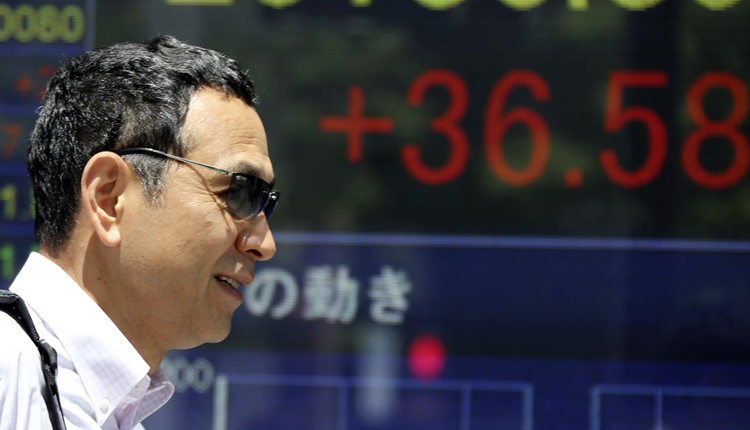Most Asian stock markets ended lower on Monday as investors digested the escalation in trade tensions between the U.S. and China after both countries announced tariffs last week.
Japan’s Nikkei 225 fell 0.75 percent, or 171.42 points, to close at 22,680.33. Shippers led losses, with the Topix sea transport subindex sliding 3.93 percent. Steelmakers dropped 1.73 percent and oil stocks tumbled 3.71 percent amid an extended drop in oil prices. All but one of the 33 Topix sectors finished the day with losses.
South Korean markets recorded steeper losses, with the benchmark Kospi ending the session down 1.16 percent at 2,376.24. The secondary Kosdaq sank 3 percent. Technology names declined, with heavyweight Samsung Electronics sliding 2.2 percent and SK Hynix tumbling 3.45 percent, but automakers notched gains. Hyundai Motor advanced 0.75 percent.
Down Under, the S&P/ASX 200 bucked the trend, with the index closing up 0.17 percent at 6,104.10. Declines in the materials and energy subindexes were offset by gains in the financials sector, as Australia’s “Big Four” banks all rose.
Other markets in the region also came under pressure, with Singapore’s Straits Times Index losing 0.92 percent and Malaysian shares dropping around 0.93 percent by 3:00 p.m. HK/SIN. MSCI’s index of shares in Asia Pacific outside of Japan eased 0.47 percent during Asia afternoon trade.
Markets in China, Hong Kong, Taiwan and Indonesia were closed on Monday for holidays.
Trade dust-up
Trade was at the tops of investors’ minds after the Trump administration last week said it will impose a 25 percent tariff on a list of 818 items of Chinese goods worth around $34 billion beginning July 6. Measures affecting an additional 284 products worth $16 billion will be subject to review before taking effect.
In response, China said a 25 percent tariff will be implemented on U.S. goods, including soybeans and electric vehicles, worth $34 billion starting July 6. Another list of U.S. imports worth $16 billion will be subject to review before being applied.
“Although the initial $34 billion is unlikely to have material impact on both economies, it does pose risks to the global recovery and sentiment,” Tommy Xie, head of greater China research at OCBC Bank, said in a note.
Despite the latest dust-up on the trade front, U.S. stocks finished the last session well off the day’s lows. The Dow Jones industrial average slipped 0.34 percent, or 84.83 points, to close at 25,090.48, after losing as much as 280.93 points earlier.
On the energy front, oil prices extended losses after slumping in the last session ahead of OPEC’s meeting in Vienna later this week. The declines also came amid the trade jitters, as energy products had been included in the list of additional U.S. goods that China could target at a later date.
Brent crude futures slipped 0.46 percent to trade at $73.10 per barrel after settling more than 3 percent lower on Friday. U.S. crude futures declined 1.52 percent to $64.07.
The dollar firmed slightly against a basket of currencies early on Monday, hovering just below the seven-month high of 95.131 touched on Friday amid concerns over trade.
“The reason why the dollar is behaving this way is because while a trade war is bad news for everyone it is even worse for the countries being singled out as many of them rely heavily on U.S. demand,” Kathy Lien, managing director of FX strategy at BK Asset Management, said in a note.
The dollar index, which tracks the dollar against a basket of currencies, last stood at 94.926. Against the yen, the dollar slipped to trade at 110.55 at 2:52 p.m. HK/SIN.
In individual stocks, Rio Tinto was down 1.97 percent after reiterating that iron ore shipment guidance for 2018 was unchanged at between 330 million and 340 million tons. Other Australian-listed mining majors saw losses of more than 1 percent.
Source: CNBC


